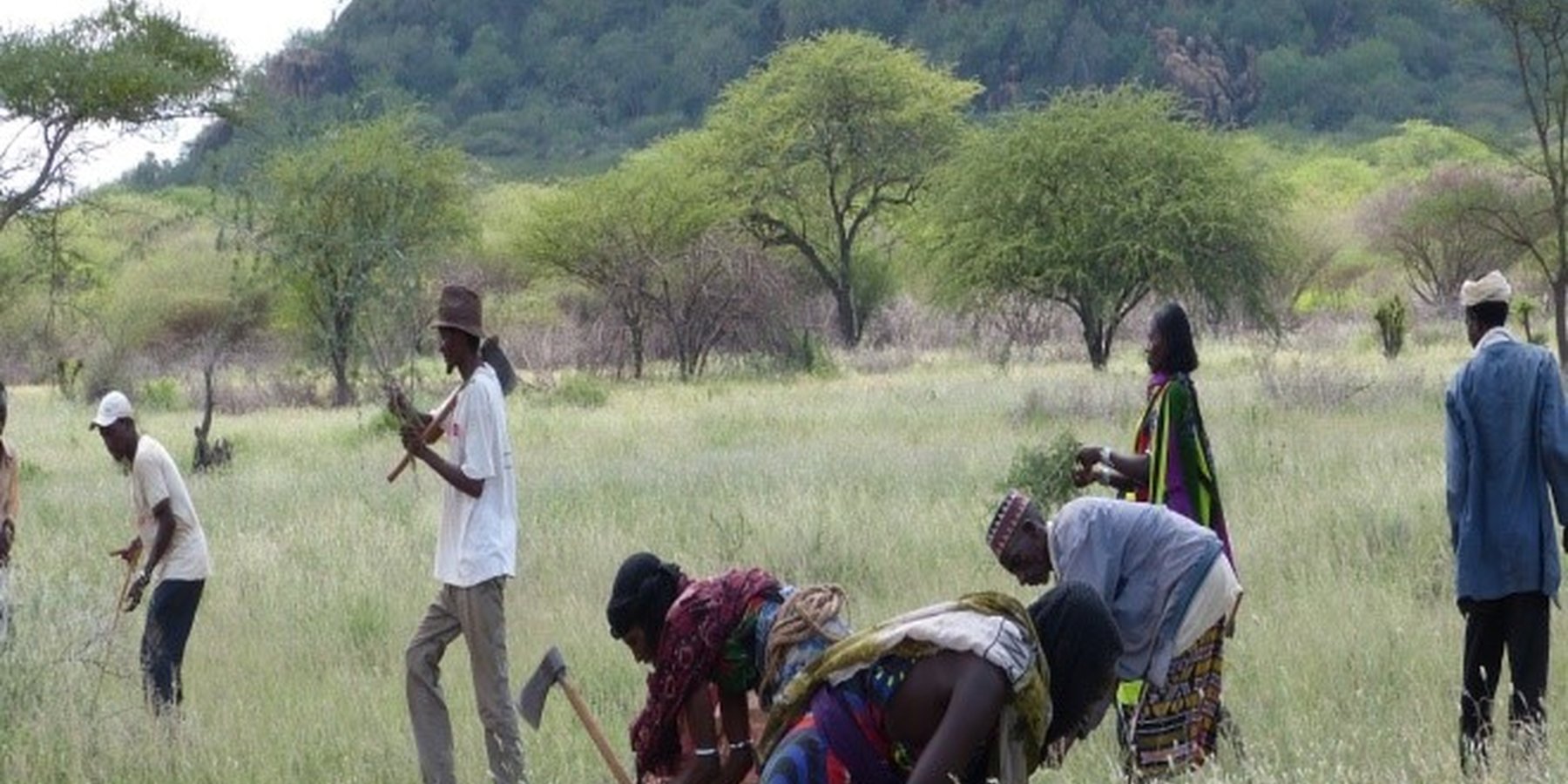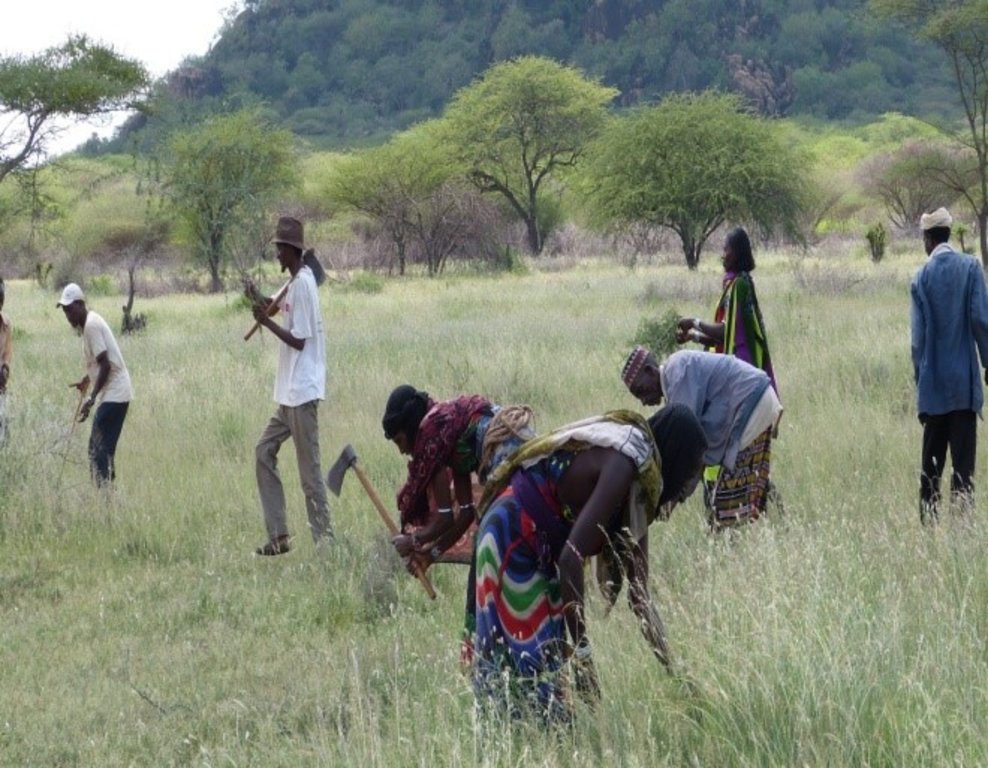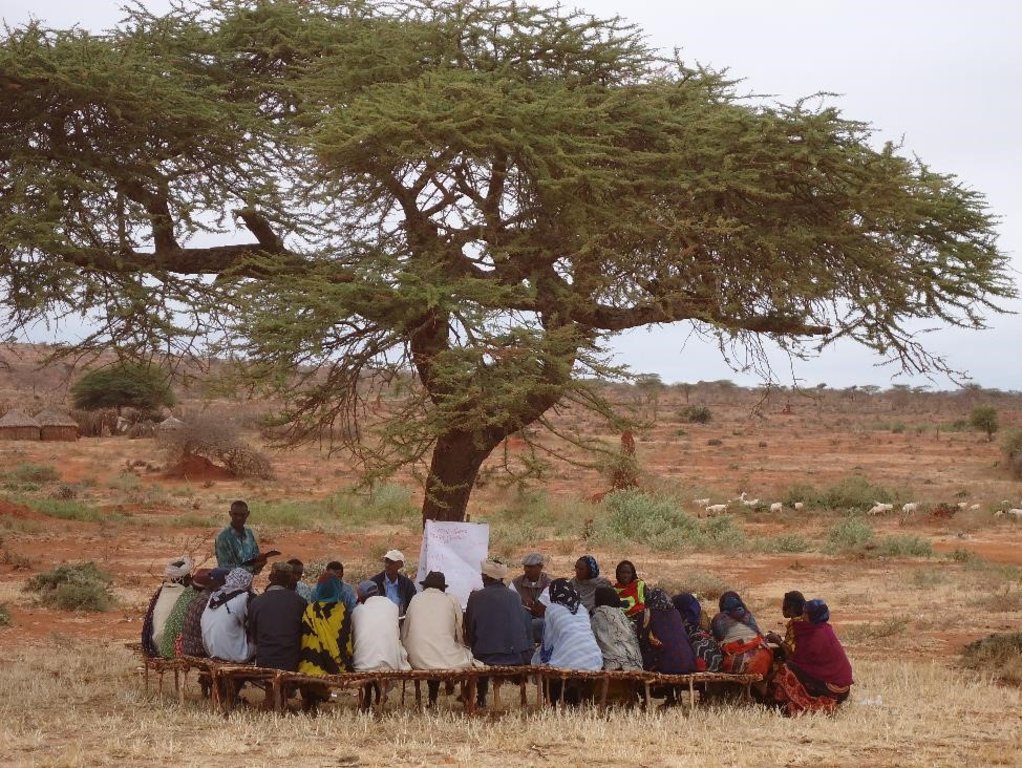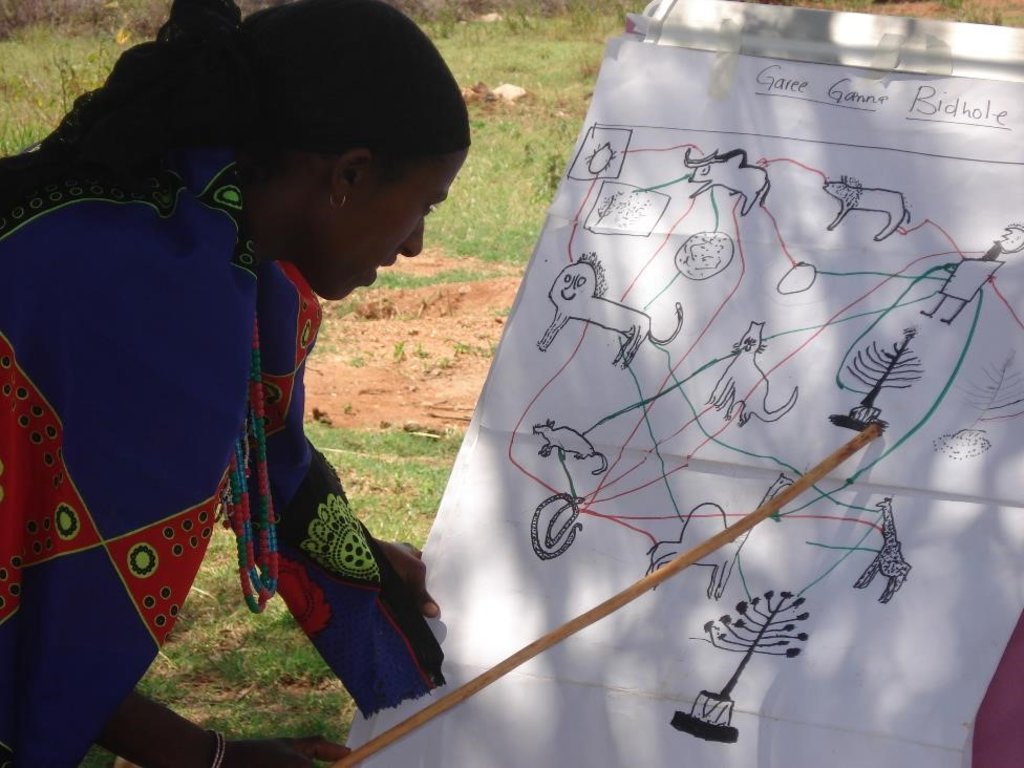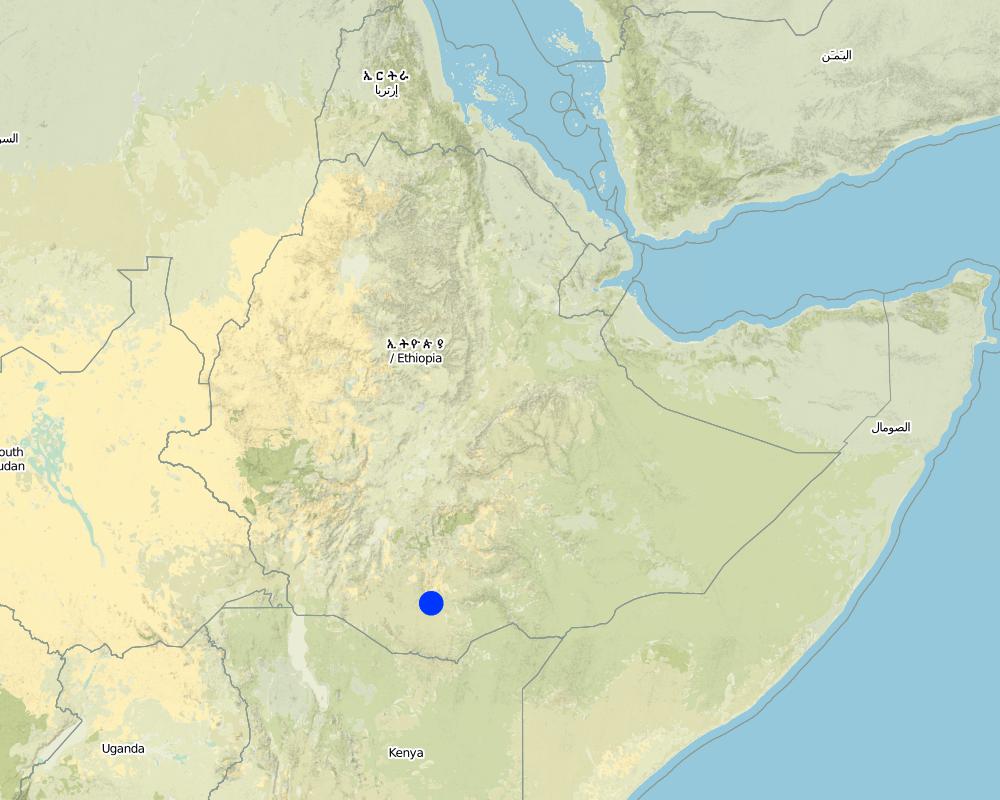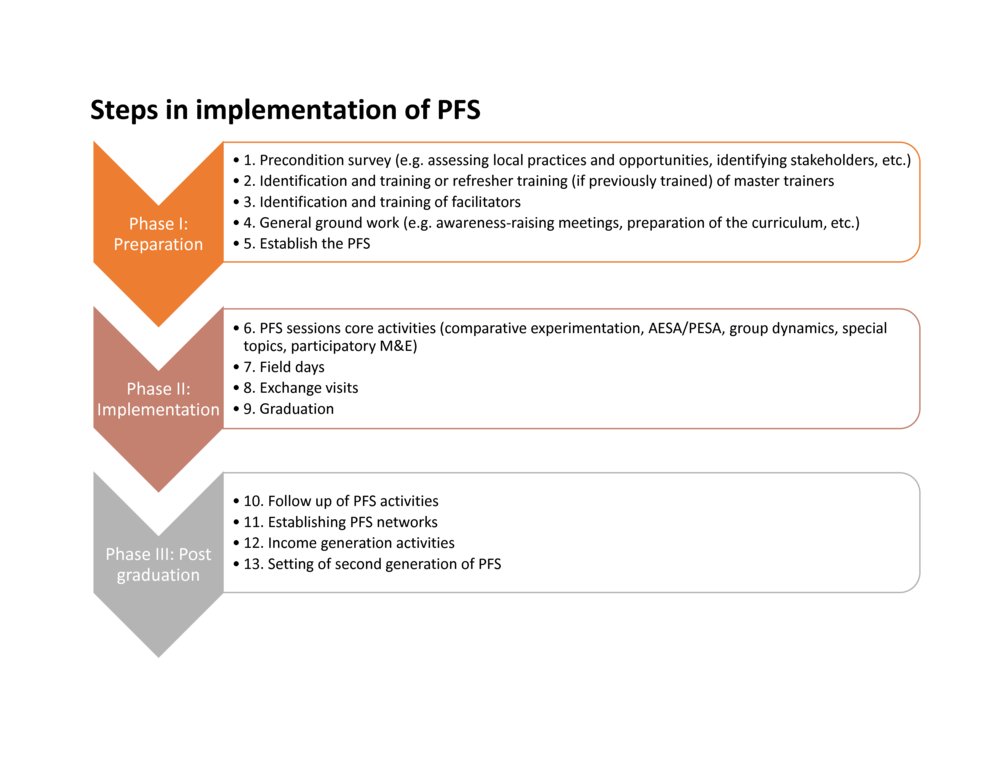Pastoralist field schools [ອີທິໂອເປຍ]
- ການສ້າງ:
- ປັບປູງ:
- ຜູ້ສັງລວມຂໍ້ມູນ: Giacomo de' Besi
- ບັນນາທິການ: –
- ຜູ້ທົບທວນຄືນ: Rima Mekdaschi Studer, Barbara *, Donia Mühlematter
approaches_3337 - ອີທິໂອເປຍ
- ສະຫຼຸບສັງລວມຢ່າງທັງໝົດທີ່ເປັນ PDF
- ສັງລວມເປັນບົດ PDF ເພື່ອສັ່ງພິມ
- ສັງລວມເປັນບົດ ຢູ່ໃນ browser
- ບົດສະຫຼຸບ ສະບັບເຕັມ (ບໍ່ມີແບບຟອມ)
- Pastoralist field schools: Oct. 9, 2018 (inactive)
- Pastoralist field schools: April 24, 2018 (inactive)
- Pastoralist field schools: Nov. 2, 2021 (inactive)
- Pastoralist field schools: July 4, 2018 (inactive)
- Pastoralist field schools: March 15, 2018 (inactive)
- Pastoralist field schools: Aug. 21, 2024 (public)
ເບິ່ງພາກສ່ວນ
ຂະຫຍາຍທັງໝົດ ຍຸບທັງໝົດ1. ຂໍ້ມູນທົ່ວໄປ
1.2 ລາຍລະອຽດ ການຕິດຕໍ່ ຂອງບຸກຄົນທີ່ຊັບພະຍາກອນ ແລະ ສະຖາບັນ ການມີສ່ວນຮ່ວມ ໃນການປະເມີນຜົນ ແລະ ເອກະສານ ຂອງວິທີທາງ
ບຸກຄົນສຳຄັນ (ຫຼາຍຄົນ)
ຜູ້ຊ່ຽວຊານ ດ້ານການຄຸ້ມຄອງ ທີ່ດິນແບບຍືນຍົງ:
Duveskog Deborah
Deborah.Duveskog@fao.org
Food and Agriculture Organization of the United Nations (FAO)
United Nations Complex in Nairobi, UN Avenue, Gigiri, Block P Box 30470 Nairobi, Kenya
ເຄັນຢາ
ຜູ້ຊ່ຽວຊານ ດ້ານການຄຸ້ມຄອງ ທີ່ດິນແບບຍືນຍົງ:
Nega Solomon
Solomon.Nega@fao.org
Food and Agriculture Organization of the United Nations (FAO)
CMC road Near ILRI, Kebele 12/13 Bole Sub City, Gurd Shola P.O. Box 5536 Addis Ababa, Ethiopia
ອີທິໂອເປຍ
ຊື່ຂອງໂຄງການ ທີ່ອໍານວຍຄວາມສະດວກ ໃນການສ້າງເອກກະສານ ຫຼື ປະເມີນດ້ານແນວທາງ (ຖ້າກ່ຽວຂ້ອງ)
Improved food security, livelihoods and resilience of vulnerable pastoral communities in the Greater Horn of Africa through the pastoralist field school approachຊື່ຂອງ ສະຖາບັນການຈັດຕັ້ງ ທີ່ອໍານວຍຄວາມສະດວກ ໃນການສ້າງເອກກະສານ ຫຼື ປະເມີນແນວທາງ (ຖ້າກ່ຽວຂ້ອງ)
FAO Kenya (FAO Kenya) - ເຄັນຢາຊື່ຂອງ ສະຖາບັນການຈັດຕັ້ງ ທີ່ອໍານວຍຄວາມສະດວກ ໃນການສ້າງເອກກະສານ ຫຼື ປະເມີນແນວທາງ (ຖ້າກ່ຽວຂ້ອງ)
Food and Agriculture Organization of the United Nations (FAO) - ອີຕາລີ1.3 ເງື່ອນໄຂ ຂອງການນໍາໃຊ້ເອກກະສານຂໍ້ມູນ ຂອງ WOCAT
ເມື່ອໃດທີ່ໄດ້ສັງລວມຂໍ້ມູນ (ຢູ່ພາກສະໜາມ)?
01/04/2014
ຜູ້ສັງລວມ ແລະ ບັນດາຜູ້ຕອບແບບສອບຖາມ ຍອມຮັບໃນເງື່ອນໄຂ ການນໍາໃຊ້ຂໍ້ມູນເອກະສານ ທີ່ສ້າງຂື້ນ ໂດຍຜ່ານ ອົງການ WOCAT:
ແມ່ນ
2. ພັນລະນາ ແນວທາງການຄຸ້ມຄອງນໍາໃຊ້ດິນແບບຍືນຍົງ
2.1 ການອະທິບາຍ ໂດຍຫຍໍ້ ຂອງວິທີທາງ
Pastoralist field schools improve livelihoods and resilience of pastoral communities through a process of hands-on experimental and participatory learning. They are "schools without walls" that introduce good agricultural and marketing practices while building on local knowledge. The PFS approach builds heavily on the basic principles of discovery based learning to address a wide range of issues affecting pastoral livelihoods.
2.2 ການອະທິບາຍ ລາຍລະອຽດ ຂອງວິທີທາງ
ການອະທິບາຍ ລາຍລະອຽດ ຂອງວິທີທາງ:
The Pastoral Field School (PFS) approach was the key development tool used in the FAO project entitled “Improved food security, livelihoods and resilience of vulnerable pastoral communities in the Greater Horn of Africa through the pastoralist field school approach”. The project was implemented between June 2011 and July 2015 and targeted agropastoralists in the West Pokot and Turkana areas of Kenya, the Karamoja area of Uganda and Borena and Guji Zones of Ethiopia. Indirect beneficiaries included Non-governmental organizations (NGO) and development actors involved in PFS actions across the region, largely through capacity building. The project was implemented through FAO regional and country offices in close collaboration with selected implementation partners in the countries, including communities, both local and international NGOs and governments.
The PFS approach is an adaptation of the Farmer Field School (FFS) approach. The FFS approach emerged in South East Asia in 1989 as a way to better engage farmers in a field-based enquiry for participatory identification and adoption/adaptation of solutions to local problems. The approach builds on the principles of adult and non-formal education, and experimental and emancipatory learning with a focus on learning processes and building analytical capacity as opposed to traditional extension approaches that focus on top-down dissemination of information to farmers. The PFS approach was first tested in 2006 in Kenya by FAO, Vétérinaires Sans Frontières Belgium and the International Livestock Research Institute (ILRI).
A PFS can be described as "school without walls" that introduces new pastoral techniques and practices (including SLM technologies) while building on indigenous knowledge, with community empowerment as a result. Through experiential and participatory learning techniques applied in a group setting (25-30 members), with regular meetings over a season/production cycle, , (agro-)pastoralists learn how to analyse their situation and make informed decisions about their livelihood practices and resource use strategies. When empowered to make informed decisions and adapt to changes in the environment, community members are better able to support disaster risk reduction and mitigation of climate change impacts. A facilitator (trained by an experienced field schoolmaster trainer and with a good understanding of pastoral issues) guides the learning process and ensures that the group activities are interlinked with a community managed disaster risk reduction plan. The technical topics covered can include animal production and health, pasture and range management, dryland farming, livestock fodder production, community-managed disaster risk reduction and alternative incomes. The informal nature of the approach further provides an excellent entry point to address social issues of gender inequities including gender-based violence, HIV, public health, population growth as well as conflict.
Mobility is an important factor to be considered in PFS as it bears on aspects such as the frequency and location of meetings. In some cases, PFS activities have to be interrupted during pastoral movements while in others the facilitator has to follow the field school group during migration. Agro-pastoralists may not always be available to participate in PFS activities as they may spend many hours or days with their livestock in search of water or fodder. Generally, PFS has a longer cycle than groups focusing on small-scale farming, and flexibility is needed when unforeseen events disrupt learning activities. Pastoralists and agro-pastoralists often live in conditions of high environmental uncertainty.
2.3 ຮູບພາບຂອງແນວທາງ
2.4 ວີດີໂອ ຂອງວິທີທາງ
ຄວາມຄິດເຫັນ, ຄໍາອະທິບາຍຫຍໍ້:
Link: https://youtu.be/9rqZUEVF_kA
Schools Without Walls', (Agro)Pastoralist Field Schools in the Horn of Africa
See how members of Arbale Pastoralist Field School in Borana Zone, Southern Ethiopia are applying knowledge gained to implementing community managed disaster risk reduction action plans for the protection of vast areas of communal grazing lands.
ວັນທີ:
28/05/2013
ສະຖານທີ່:
Borana Zone, Southern Ethiopia
ຊື່ຂອງຜູ້ຖ່າຍວີດີໂອ:
© FAO: http://www.fao.org
ຄວາມຄິດເຫັນ, ຄໍາອະທິບາຍຫຍໍ້:
Link: https://youtu.be/W0blRPPn3hg
Community Fodder Production in Mandera - Kenya
This video highlights how a pastoralist community in Mandera, Kenya applied knowledge gained in a pastoralist field school to improve their livelihood through fodder production.
ວັນທີ:
28/05/2013
ສະຖານທີ່:
Mandera, Kenya
ຊື່ຂອງຜູ້ຖ່າຍວີດີໂອ:
© FAO: http://www.fao.org
2.5 ປະເທດ / ເຂດ / ສະຖານທີ່ບ່ອນທີ່ແນວທາງໄດ້ຖືກນໍາໃຊ້
ປະເທດ:
ອີທິໂອເປຍ
ພາກພື້ນ / ລັດ / ແຂວງ:
Oromia region
ຂໍ້ມູນເພີ່ມເຕີມຂອງສະຖານທີ່:
Borena zone
ຄວາມຄິດເຫັນ:
The PFS approach was applied in the Borena Zone as part of a FAO regional initiative that targeted agropastoralists in the West Pokot and Turkana areas of Kenya, the Karamoja area of Uganda and Borena and Guji Zones of Ethiopia.
Map
×2.6 ວັນທີເລີ່ມຕົ້ນ ແລະ ສິ້ນສຸດ ການຈັດຕັ້ງປະຕີບັດ ວິທີທາງ
ສະແດງປີຂອງການເລີ່ມຕົ້ນ:
2011
ຄວາມຄິດເຫັນ:
The approach was used within the framework of the FAO project entitled “Improved food security, livelihoods and resilience of vulnerable pastoral communities in the Greater Horn of Africa through the pastoral field school approach”. The project was implemented from 1 June 2011 to 31 July 2015. PFS learning enabled members to continue PFS activities and learning also after the end of the project.
2.7 ປະເພດຂອງແນວທາງ
- ການລິເລີ່ມ ພາຍໃນປະເທດ ທີ່ຜ່ານມາ / ນະວັດຕະກໍາ
2.8 ເປົ້າໝາຍ / ຈຸດປະສົງຫຼັກ ຂອງການຈັດຕັ້ງປະຕິບັດ ວິທີທາງ
To strengthen the capacity of pastoral communities and support improved natural resources management and disaster risk management to reduce food insecurity vulnerability.
2.9 ເງື່ອນໄຂອໍານວຍ ຫຼື ຂັດຂວາງການປະຕິບັດຂອງເຕັກໂນໂລຢີ / ເຕັກໂນໂລຢີການນໍາໃຊ້ຕາມແນວທາງ
ສັງຄົມ / ວັດທະນະທໍາ / ມາດຕະຖານ ແລະ ຄຸນຄ່າທາງສາສະໜາ
- ອໍານວຍ
- Pastoralists were able, committed and willing to work in teams and to invest their time in PFS learning activities.
- The community had a positive attitude to change and the local culture allowed for innovations.
ມີຄວາມສາມາດ / ເຂັ້າເຖິງຊັບພະຍາກອນດ້ານການເງິນ ແລະ ການບໍລິການ
- ອໍານວຍ
- PFS activities, learning and group action facilitated leveraging of financial resources and services. All PFS groups developed savings and credit schemes.
ການກໍ່ຕັ້ງສະຖາບັນ
- ອໍານວຍ
- Efforts towards institutionalization enhanced PFS sustainability, improved quality, and strengthened impact and continuity.
ການຮ່ວມມື / ການປະສານງານຂອງຜູ້ກ່ຽວຂ້ອງ
- ເຊື່ອງຊ້ອນ
- Networking among implementing actors and key stakeholders could have been stronger.
ນະໂຍບາຍ
- ເຊື່ອງຊ້ອນ
- The PFS approach wasn't part of Government structures and procedures, so no enabling policies were in place
ຄວາມຮູ້ກ່ຽວກັບການຄຸ້ມຄອງ ທີ່ດິນແບບຍືນຍົງ, ການເຂົ້າເຖິງການສະໜັບສະໜູນ ທາງດ້ານວິຊາການ
- ອໍານວຍ
- PFS facilitators received technical support from subject matter specialists (e.g. animal scientists, veterinarians, agronomists). The specialists were invited to the PFS by the facilitators whenever technical inputs and assistance in designing appropriate experiments were needed.
- SLM technologies/ PFS practices were built on indigenous knowledge and local practices.
ຕະຫຼາດ (ໃນການຊື້ວັດຖຸດິບ, ຂາຍຜະລິດຕະພັນ) ແລະ ລາຄາ
- ອໍານວຍ
- Promoting the use of locally available resources (e.g. agricultural and livestock inputs) was crucial to ensure PFS sustainability and the continuity of PFS activities.
3. ການມີສ່ວນຮ່ວມ ແລະ ບົດບາດຂອງພາກສ່ວນທີ່ກ່ຽວຂ້ອງທີ່ໄດ້ມີສ່ວນຮ່ວມ
3.1 ຜູ້ມີສ່ວນຮ່ວມ ໃນວິທີທາງ ແລະ ພາລະບົດບາດ ຂອງເຂົາເຈົ້າ
- ຜູ້ນໍາໃຊ້ດິນໃນທ້ອງຖິ່ນ / ຊຸມຊົນທ້ອງຖິ່ນ
Pastoralists- PFS members and their communties.
Field school activities were carried out by the pastoralists themselves, ensuring a strong level of involvement of the beneficiaries throughout all stages of implementation.
- ອົງການຈັດຕັ້ງ ທີ່ບໍ່ຂື້ນກັບລັດຖະບານ
Gayo Pastoral Development Initiative.
Implement Pastoralist Field School in the Borena zone.
- ອໍານາດ ການປົກຄອງທ້ອງຖິ່ນ
- Miyo Pastoral Development Association (Government Institution).
- Moyalle Pastoral Development Association (Government Institution).
Implement Pastoralist Field School in the Borena zone.
- ອົງການຈັດຕັ້ງ ສາກົນ
Food and Agriculture Organization of the United Nations (FAO).
FAO was responsible for overseeing the overall implementation of the intervention, providing mentoring and technical support, create platform for harmonizing the field school approach and allocate required resources for implementation, provide guidance on linkages with related regional pastoral initiatives. The overall day-to-day management of the project was led by FAO's Resilience Team for Eastern Africa (RTEA), drawing on the technical expertise and experience of its headquarters in Nairobi, Kenya and its Subregional Office for Eastern Africa in Addis Ababa. Activities in Ethiopia were supported by the FAO Country Office. FAO field offices implemented the project in the targeted field locations, in collaboration with Non-Governmental Organizations (NGOs) and Government partners.
ຖ້າຫາກມີຫຼາຍພາກສ່ວນທີ່ເຂົ້າຮ່ວມ ໃຫ້ລະບຸ ອົງການທີ່ເປັນຫຼັກ ໃນການຈັດຕັ້ງປະຕິບັດ:
Food and Agriculture Organization of the United Nations (FAO)
3.2 ການມີສ່ວນຮ່ວມຂອງຜູ້ນໍາໃຊ້ທີ່ດິນໃນທ້ອງຖິ່ນ / ຊຸມຊົນທ້ອງຖິ່ນໃນໄລຍະທີ່ແຕກຕ່າງກັນຂອງແນວທາງ
| ການລວບລວມ ເອົາຜູ້ນໍາໃຊ້ດິນ ໃນທ້ອງຖິ່ນ / ຊຸມຊົນທ້ອງຖິ່ນ | ໃຫ້ລະບຸ ຜູ້ໃດທີ່ມີສ່ວນຮ່ວມ ໃນແຕ່ລະກິດຈະກໍາ? | |
|---|---|---|
| ການເລີ່ມຕົ້ນ / ແຮງຈູງໃຈ | ການຮ່ວມມື | The PFS approach was presented to pastoral communities and their leaders as well as to local stakeholders (e.g. local government, development partners) to seek buy-in and collaboration. |
| ການວາງແຜນ | ການຮ່ວມມື | Needs, priorities and opportunities for improvement were identified through a consultative process with the community before and throughout PFS implementation. The PFS members, not the facilitator, decided what was relevant to them and what they wanted the PFS to address. |
| ການປະຕິບັດ | ການຮ່ວມມື | As per PFS principles, the pastoral community was involved in all activities during project implementation and had a decision-making role. The dissemination of PFS practices/SLM technologies was encouraged among members and pastoral communities. Exchange visits (educational tours to other PFS), field days (getting non-PFS members involved in PFS activities), and share fairs were organized to promote trade and exchange of ideas. |
| ຕິດຕາມກວດກາ / ການປະເມີນຜົນ | ການຮ່ວມມື | The expansion of monitoring and evaluation tools and processes was part of the regular PFS implementation, with exercises and tools embedded in the PFS sessions to assess progress and allow members to take corrective action based on the results. |
| Impact assessment | ການຮ່ວມມື | A major achievement of the intervention was the participatory impact assessment. The assessment was conducted using a mix of methods, including focus group discussions with PFS members, case stories, semi-structured interviews and scoring of perceived change before and after PFS membership. |
3.3 ແຜນວາດ (ຖ້າມີ)
3.4 ການຕັດສິນໃຈກ່ຽວກັບການຄັດເລືອກເຕັກໂນໂລຢີຂອງການຄຸ້ມຄອງທີ່ດິນແບບຍືນຍົງ / ເຕັກໂນໂລຢີ
ລະບຸ ຄົນທີ່ຕັດສິນໃຈ ກ່ຽວກັບການຄັດເລືອກຂອງ ເຕັກໂນໂລຢີ / ເຕັກໂນໂລຢີ ຈະໄດ້ຮັບການປະຕິບັດ:
- ຜູ້ນໍາໃຊ້ທີ່ດິນຫຼັກ, ການສະໜັບສະໜູນ ໂດຍຜູ້ຊ່ຽວຊານ ການນໍາໃຊ້ທີ່ດິນແບບຍືນຍົງ
ອະທິບາຍ:
In PFS, learning is by doing, i.e. through practical activities and exercises. Throughout PFS implementation, members tested, validated, and adapted SLM technologies to their environments.
Specify on what basis decisions were made:
- ປະສົບການສ່ວນບຸກຄົນ ແລະ ຄວາມຄິດເຫັນ (ທີ່ບໍ່ເປັນເອກກະສານ)
- hands-on testing and adaptation for local use
4. ການສະໜັບສະໜູນທາງດ້ານວິຊາການ, ການສ້າງຄວາມສາມາດ, ແລະ ການຈັດການຄວາມຮູ້.
4.1 ການສ້າງຄວາມສາມາດ / ການຝຶກອົບຮົມ
ຜູ້ນໍາໃຊ້ທີ່ດິນ ຫຼື ພາກສ່ວນກ່ຽວຂ້ອງອື່ນໆ ໄດ້ຮັບການຝຶກອົບຮົມບໍ່?
ແມ່ນ
ໃຫ້ລະບຸ ຜູ້ໃດທີ່ໄດ້ຮັບການຝຶກອົບຮົມ:
- ຜູ້ນໍາໃຊ້ດິນ
- ພະນັກງານພາກສະໜາມ / ທີ່ປຶກສາ
ຖ້າເປັນໄປໄດ້, ໃຫ້ລະບຸເພດ, ອາຍຸ, ສະຖານະພາບ, ຊົນເຜົ່າ, ແລະ ອື່ນໆ:
PFS are schools without walls where members actively learn through comparison of local practices with new ideas through Agro ecosystem analysis and comparative experiments, observation, critical analysis, discussion and making decisions. Technical training of PFS members forms part of the regular learning curriculum and is based on learner driven.
The intervention also involved the training of facilitators, mentors and master trainers.
Facilitators guide PFS activities and group discussions and help the group to reach a consensus on the actions that need to be taken. Before the onset of the PFS, facilitators organize preparatory activities, such as community consultations and PFS group formation and organization. The intervention trained new facilitators and carried out refresher training of existing facilitators. Training was supported by on-the-job training events and regular support to facilitators.
The main role of PFS master trainers is to train facilitators, mentoring FFS activities, planning, mentoring and monitoring and evaluation of FFS activities and promoting the field school approach. They received training through a three-month master trainer course. In direct connection with and during the master trainer training course, a number of PFS groups were established at community level for practical and hands-on learning among master trainers. Throughout the implementation period, FAO provided continuous mentoring to the master trainers to support their continuous professional development.
In the Borena zone, PFS activities were complemented by the strengthening of water points developed thorough an earlier SDC project.
ຮູບແບບຂອງການຝຶກອົບຮົມ:
- ການເຮັດຕົວຈິງ
- ຕົວຕໍ່ຕົວ
- ເນື້ອທີ່ສວນທົດລອງ
ໃນຫົວຂໍ້:
The curriculum of PFS groups generally focused on: methodology and implementation, participatory learning and facilitation, group management and technical topics.
Some of the technical topics covered by the facilitator include gender, NRM, nutrition, forage production and health, conflict management, business skills development, village community banks (VICOBA), rangeland management, soil and water conservation and community-managed disaster risk reduction (CMDRR), and water scheme management.
4.2 ການບໍລິການໃຫ້ຄໍາປຶກສາ
ເຮັດຜູ້ໃຊ້ທີ່ດິນມີການເຂົ້າເຖິງການບໍລິການໃຫ້ຄໍາປຶກສາ?
ແມ່ນ
ລະບຸວ່າການສະໜອງ ການບໍລິການ ໃຫ້ຄໍາປຶກສາ:
- ໃນພື້ນທີ່ຂອງຜູ້ນໍາໃຊ້ດິນ
ອະທິບາຍ / ຄວາມຄິດເຫັນ:
PFS are ‘schools without walls’ where capacity is developed from existing local knowledge. They are learning by doing and problem based, on the fields/rangelands of the community. PFS usually comprises a group of 25-30 pastoralists who meet regularly in a local field setting, under the guidance of a trained facilitator. They make observations on livestock production and rangeland ecosystem, focus on a topic of study, and compare the effects of alternative practices. As a result of the observations and analyses done directly on-site, participants make decisions on how to improve their practices. All PFS follow this systematic action learning process where the key steps are observation, reflection, group discussion, analysis, decision making and action planning.
4.3 ສະຖາບັນການສ້າງຄວາມເຂັ້ມແຂງ (ການພັດທະນາອົງການຈັດຕັ້ງ)
ສະຖາບັນ ໄດ້ຮັບການສ້າງຕັ້ງຂື້ນ ຫຼື ໄດ້ຮັບການສ້າງຄວາມເຂັ້ມແຂງ ໂດຍການຈັດຕັ້ງປະຕິບັດ ວິທີທາງບໍ່?
- ມີ, ພໍສົມຄວນ
ລະບຸ ທາງສະຖາບັນ ໄດ້ສ້າງຄວາມເຂັ້ມແຂງ ໃນລະດັບໃດ (ຫຼາຍ):
- ທ້ອງຖິ່ນ
- ແຫ່ງຊາດ
ອະທິບາຍ ສະຖາບັນການຈັດຕັ້ງ, ພາລະບົດບາດ ແລະ ໜ້າທີ່ຮັບຜິດຊອບ, ສະມາຊິກ ແລະ ອື່ນໆ.
The two government institutions (Miyo Pastoral Development Association and Moyalle Pastoral Development Association). and the NGO (Gayo Pastoral Development Initiative) that implemented the approach in the target area has been strengthened through capacity building on PFS.
ລະບຸ ປະເພດ ຂອງສະໜັບສະໜູນ:
- ການສ້າງຄວາມອາດສາມາດ / ການຝຶກອົບຮົມ
4.4 ຕິດຕາມກວດກາ ແລະ ປະເມີນຜົນ
ການຈັດຕັ້ງປະຕິບັດ ວິທີທາງ ໄດ້ມີການປະເມີນຜົນ ແລະ ຕິດຕາມບໍ?
ແມ່ນ
ຄວາມຄິດເຫັນ:
Monitoring was conducted by the Swiss Agency for Development and Cooperation (SDC) office in Addis Ababa as well as through field missions and regular dialogue with the FAO Country Office in Ethiopia.
As per PFS priniciples, participatory M&E was also conducted during every PFS meeting. Both the PFS members and facilitator continuously assessed whether they were bringing any behavioural changes and actually achieving the learning objectives. Participatory M&E helped PFS practitioners actively observe and analyse situations and performances and understand what they were observing.
ຖ້າແມ່ນ, ເອກກະສານສະບັບນີ້ ແມ່ນໄດ້ນໍາໃຊ້ເຂົ້າໃນການຕິດຕາມ ແລະ ປະເມີນຜົນບໍ່?
ບໍ່ແມ່ນ
4.5 ການຄົ້ນຄວ້າ
ນີ້້ແມ່ນສ່ວນໜຶ່ງ ການຄົ້ນຄວ້າ ຂອງວິທີທາງບໍ່?
ແມ່ນ
ລະບຸ ຫົວຂໍ້:
- ເສດຖະສາດ / ການຕະຫຼາດ
- ເຕັກໂນໂລຢີ
ໃຫ້ຂໍ້ມູນ ເພີ່ມເຕີມ ແລະ ກໍານົດ ຜູ້ໃດເຮັດການຄົ້ນຄວ້າ:
When needed, researchers and subject matter experts were invited to provide technical support to PFS groups. PFS developed/strengthened linkages between pastoral communities and researchers.
5. ການສະໜັບສະໜູນທາງດ້ານການເງິນ ແລະ ອຸປະກອນຈາກພາຍນອກ
5.1 ງົບປະມານປະຈໍາປີ ສໍາລັບວິທີທາງ ຂອງການຄຸ້ມຄອງ ທີ່ດິນແບບຍືນຍົງ
ຖ້າຫາກບໍ່ຮູ້ຈັດງົບປະມານທີ່ແນ່ນອນ ແມ່ນໃຫ້ປະມານເອົາ:
- 2,000-10,000
ຄໍາເຫັນ (ຕົວຢ່າງ: ແຫຼ່ງຂໍ້ມູນຫຼັກ ຂອງການສະໜອງທຶນ / ຜູ້ໃຫ້ທຶນທີ່ສໍາຄັນ):
The budget range above refers to the costs incurred for implementing a single PFS within the project.
The Government of the Swiss Confederation, through the Swiss Agency for Development and Cooperation, contributed USD 2 154 100 for this FAO for this FAO project in Ethiopia, Kenya and Uganda.
5.2 ການສະໜັບສະໜູນ ທາງດ້ານການເງິນ / ອຸປະກອນ ສະໜອງໃຫ້ແກ່ຜູ້ນໍາທີ່ດິນ
ຜູ້ນໍາໃຊ້ດິນ ໄດ້ຮັບການສະໜັບສະໜູນ ທາງດ້ານ ການເງິນ / ອຸປະກອນ ໃນການຈັດຕັ້ງປະຕິບັດ ເຕັກໂນໂລຢີບໍ?
ແມ່ນ
ຖ້າແມ່ນ, ໃຫ້ລະບຸປະເພດ (ຫຼາຍ) ຂອງການສະໜັບສະໜູນ, ເງື່ອນໄຂ ແລະ ຜູູ້ສະໜອງ (ຫຼາຍ):
Each PFS group received direct grants of USD 940 for their learning activities and to purchase inputs for PFS experimentation.
5.3 ເງິນສົມທົບສໍາລັບການນໍາໃຊ້ສະເພາະປັດໃຈຂາເຂົ້າໃນການຜະລີດກະສິກໍາ (ລວມທັງແຮງງານ)
- ບໍ່ມີ
5.4 ສິນເຊື່ອ
ໄດ້ປ່ອຍສິນເຊື່ອ ສະໜອງໃຫ້ພາຍໃຕ້ ວິທີການສໍາລັບກິດຈະກໍາ ການຄຸ້ມຄອງ ທີ່ດິນແບບຍືນນຍົງບໍ່?
ບໍ່ແມ່ນ
5.5 ສິ່ງຈູງໃຈ ຫຼື ເຄື່ອງມືອື່ນໆ
ການສົ່ງເສີມ ຈັດຕັ້ງປະຕິບັດ ເຕັກໂນໂລຢີ ໃນການຄຸ້ມຄອງ ດິນແບບຍືນຍົງ ໄດ້ສະໜອງສິ່ງກະຕຸກຊຸກຍູ້ບໍ່?
ບໍ່ແມ່ນ
6. ວິເຄາະຜົນກະທົບ ແລະ ສັງລວມບັນຫາ
6.1 ຜົນກະທົບຂອງແນວທາງ
ວິທີທາງ ຊ່ວຍຊຸກຍູ້ ຜູ້ນຳໃຊ້ທີ່ດິນທ້ອງຖີ່ນ, ໃນການປັບປຸງ ການມີສ່ວນຮ່ວມ ຂອງຜູ້ທີ່ກ່ຽວຂ້ອງ ບໍ່?
- ບໍ່
- ມີ, ໜ້ອຍໜຶ່ງ
- ມີ, ພໍສົມຄວນ
- ມີ, ຫຼາຍ
PFS enabled and empowered pastoralists, their families and pastoral communities to understand and respond to local challenges. PFS members improved their understanding of the environment, obtained knowledge and learned additional skills which lead to improved capacity to manage available resources. PFS groups showed a greater level of cooperation and mutual help compared to the situation prior to the PFS project. PFS groups demonstrated enhanced capacity to seek self-generated solutions to problems identified by the group, generally developed through the experimentation and field analysis component of PFS, which in turn positively impacted on adoption rates of new practices and technologies.
ການນໍາໃຊ້ ວິທີທາງ ດັ່ງກ່າວນີ້ ສາມາດເປັນຫຼັກຖານ ທີ່ສະໜັບສະໜູນ ໃຫ້ການຕັດສິນໃຈໄດ້ບໍ່?
- ບໍ່
- ມີ, ໜ້ອຍໜຶ່ງ
- ມີ, ພໍສົມຄວນ
- ມີ, ຫຼາຍ
PFS helped pastoralists to develop the skills required for informed decision-making in their environment.
ການຈັດຕັ້ງປະຕິບັດ ວິທີທາງ ສາມາດຊ່ວຍຜູ້ນໍາໃຊ້ທີ່ດິນ ໃນການຈັດຕັ້ງປະຕິບັດ ແລະ ບໍາລຸງຮັກສາ ເຕັກໂນໂລຢີ ການຄຸ້ມຄອງ ທີ່ດິນແບບຍືນຍົງໄດ້ບໍ?
- ບໍ່
- ມີ, ໜ້ອຍໜຶ່ງ
- ມີ, ພໍສົມຄວນ
- ມີ, ຫຼາຍ
As PFS members carried out PFS practices themselves and saw the direct results of the processes, they took ownership of the innovations and decisions on their livelihood activities. This was further enhanced by reduced production costs and the proceeds which the groups received from PFS practices that encouraged the members to continue with the efforts since they paid off.
ການນໍາໃຊ້ ວິທີທາງ ສາມາດປັບປຸງ ການປະສານງານ ແລະ ຄ່າໃຊ້ຈ່າຍ ການຈັດຕັ້ງປະຕິບັດ ທີ່ມີປະສິດທິພາບ ຂອງການຄຸ້ມຄອງ ທີ່ດິນແບບຍືດຍົງໄດ້ບໍ່?
- ບໍ່
- ມີ, ໜ້ອຍໜຶ່ງ
- ມີ, ພໍສົມຄວນ
- ມີ, ຫຼາຍ
Policy dialogue for institutionalizing PFS as an extension approach were successfully conducted with the federal Ministry of Agriculture and regional agriculture bureau and donors . The initial policy processes were funded by the European Union (EU) and the Swiss Agency for Development and Cooperation (SDC). They involved field implementation of field schools with policy deliberations at the local Government levels and cascading slowly to the National level. Later, an FAO project funded by SDC continued with the institutionalization process at the National level, Universities and research institutions. Policy makers are now willing to use the approach in the (agro)-pastoral areas of Ethiopia.
ການນໍາໃຊ້ ວິທີທາງ ສາມາດລະດົມ ຫຼື ປັບປຸງ ການເຂົ້າເຖິງຊັບພະຍາກອນ ການເງິນ ສໍາລັບການຈັດຕັ້ງປະຕິບັດ ການຄຸ້ມຄອງ ທີ່ດິນແບບຍືດຍົງໄດ້ບໍ່?
- ບໍ່
- ມີ, ໜ້ອຍໜຶ່ງ
- ມີ, ພໍສົມຄວນ
- ມີ, ຫຼາຍ
PFS increased the abilty of pastoralists to leverage appropriate financial services through group action and improved skills and knowledge. The savings and credit schemes built into PFS interventions and resulting income generating activities contributed to an increase in financial capital. In general the money contributed benefited both men and women equally. However, in many cases women were the more frequent beneficiaries since they frequently borrowed to engage in petty businesses.
ການນໍາໃຊ້ ວິທີທາງ ສາມາດປັບປຸງຄວາມຮູ້ ແລະ ຄວາມສາມາດຂອງຜູ້ນໍາໃຊ້ທີ່ດິນ ໃນການປະຕິບັດ ການຄຸ້ມຄອງ ທີ່ດິນແບບຍືດຍົງໄດ້ບໍ່?
- ບໍ່
- ມີ, ໜ້ອຍໜຶ່ງ
- ມີ, ພໍສົມຄວນ
- ມີ, ຫຼາຍ
PFS activities increased the awareness of communities on the sustainable management of natural resources and its relation to group productive and income generating activities. The PFS approach, in contrast to most conventional extension approaches, strengthens the capacity of local communities to analyse their livelihood systems, identify their main constraints and test possible solutions. By merging their own traditional knowledge with external information, stakeholders can eventually identify and adopt the most suitable practices and technologies to their livelihood system and needs to become more productive, profitable and responsive to changing conditions
ການນໍາໃຊ້ ວິທີທາງ ສາມາດປັບປຸງຄວາມຮູ້ ແລະ ຄວາມສາມາດ ຂອງພາກສ່ວນທີ່ກ່ຽວຂ້ອງໄດ້ບໍ່?
- ບໍ່
- ມີ, ໜ້ອຍໜຶ່ງ
- ມີ, ພໍສົມຄວນ
- ມີ, ຫຼາຍ
The PFS approach improved knowledge and capacities of stakeholders at different levels starting from Federal to communities level.
ການນໍາໃຊ້ ວິທີທາງ ສາມາດສ້າງຄວາມເຂັ້ມແຂງ ໃຫ້ສະຖາບັນການຈັດຕັ້ງ, ການຮ່ວມມື ລະຫວ່າງພາກສ່ວນທີ່ກ່ຽວຂ້ອງບໍ່?
- ບໍ່
- ມີ, ໜ້ອຍໜຶ່ງ
- ມີ, ພໍສົມຄວນ
- ມີ, ຫຼາຍ
The approach strengthens individuals’ knowledge and practices whilst reinforcing collaborative learning and bonding. By learning together over an extended period of time, collaboration between stakeholders/beneficiaries is strengthened.
ການນໍາໃຊ້ ວິທີທາງ ສາມາດຫຼຸດຜ່ອນ ຂໍ້ຂັດແຍ່ງໄດ້ບໍ່?
- ບໍ່
- ມີ, ໜ້ອຍໜຶ່ງ
- ມີ, ພໍສົມຄວນ
- ມີ, ຫຼາຍ
Part of this approach includes incorporating conflict management more strongly. Through the PFS approach, stakeholders developed a greater understanding of how to plan for and mitigate disaster, and recognized how social factors such as conflict and gender inequality can exacerbate the effects of disasters.
ການຈັດຕັ້ງປະຕິບັດ ວິທີທາງ ສາມາດສ້າງຄວາມເຂັ້ມແຂງ ທາງສັງຄົມ ແລະ ເສດຖະກິດບໍ່?
- ບໍ່
- ມີ, ໜ້ອຍໜຶ່ງ
- ມີ, ພໍສົມຄວນ
- ມີ, ຫຼາຍ
Many groups had set rules for dealing with individual financial requirements, as well as individual emergencies, requiring group cohesion and solidarity support mechanisms, thus enhancing the community internal safety net for vulnerable members.
ການຈັດຕັ້ງປະຕິບັດ ວິທີທາງ ສາມາດປັບປຸງ ຄວາມສະເໜີພາບ ຂອງບົດບາດ ຍິງຊາຍ ແລະ ສ້າງຄວາມເຂັ້ມແຂງໃຫ້ຜູ້ຍິງໄດ້ບໍ່?
- ບໍ່
- ມີ, ໜ້ອຍໜຶ່ງ
- ມີ, ພໍສົມຄວນ
- ມີ, ຫຼາຍ
Women benefited from the initiative through empowerment and income generation through livelihood diversification. Women’s empowerment – i.e. enabling their inherent potential – was considered as one of the most prominent impacts of the intervention. Changes in gender relations as a result of the PFS approach was prominent. Women appreciated the fact that the PFS groups offered the opportunity for them to discuss issues and challenges with men in an organised and moderated manner. In general, and given the prevailing cultural norms, women had the opportunity to make their voices and arguments heard in all PFS groups.
ການຈັດຕັ້ງປະຕິບັດ ວິທີທາງ ສາມາດຊຸກຍູ້ ຜູ້ນໍາໃຊ້ທີ່ດິນທີ່ເປັນຊາວໜຸ່ມ / ຄົນລຸ້ນໃໝ່ ໃນການຄຸ້ມຄອງ ທີ່ດິນແບບຍືນຍົງໄດ້ບໍ?
- ບໍ່
- ມີ, ໜ້ອຍໜຶ່ງ
- ມີ, ພໍສົມຄວນ
- ມີ, ຫຼາຍ
Elema Kensa, a young PFS lady member said, “Women benefit from the enclosure in many ways. Before, women used to go very far in order bring food to our livestock. But, thanks to the PFS and our enclosure now we can harvest the grass nearby and give it to our livestock. Having this grass nearby reduces the burden of the women and this is a result of the education we got from PFS.”
ການຈັດຕັ້ງປະຕິບັດ ວິທີທາງ ສາມາດປັບປຸງ ປະເດັນການຖືຄອງທີ່ດິນ / ສິດທິໃນການນໍາໃຊ້ທີ່ດິນ ທີ່ເຊື່ອງຊ້ອນໃນການຈັດຕັ້ງປະຕິບັດ ເຕັກໂນໂລຢີ ການຄຸ້ມຄອງ ທີ່ດິນແບບຍືນຍົງໄດ້ບໍ?
- ບໍ່
- ມີ, ໜ້ອຍໜຶ່ງ
- ມີ, ພໍສົມຄວນ
- ມີ, ຫຼາຍ
The community initiative led by the PFS group has taken to practicing the approach for their own livestock needs. The protected community grazing lands were fenced off, and livestock grazing was restricted and managed.
ການນໍາໃຊ້ ວິທີທາງ ໄດ້ປັບປຸງ ການຄໍ້າປະກັນສະບຽງອາຫານ ຫຼື ປັບປຸງໂຄສະນາການໄດ້ບໍ່?
- ບໍ່
- ມີ, ໜ້ອຍໜຶ່ງ
- ມີ, ພໍສົມຄວນ
- ມີ, ຫຼາຍ
Supported by PFS training and financed through the group saving schemes, most PFS groups initiated alternative income sources, resulting in diversified livelihood options and thereby increased food security and nutrition. The domestic food situation improved since the start of PFS activities in the target area as a result of increased agricultural production and increased purchasing power to buy additional food from alternative income sources.
ການຈັດຕັ້ງປະຕິບັດ ວິທີທາງ ສາມາດປັບປຸງ ການເຂົ້າເຖິງຕະຫຼາດໄດ້ບໍ?
- ບໍ່
- ມີ, ໜ້ອຍໜຶ່ງ
- ມີ, ພໍສົມຄວນ
- ມີ, ຫຼາຍ
PFS activities increased access to input (e.g. agricultural equipment) and output markets and helped pastoralists to leverage appropriate markets and market information.
ການນໍາໃຊ້ ວິທີທາງ ໄດ້ປັບປຸງ ການເຂົ້າເຖິງນໍ້າ ແລະ ສາຂາພິບານໄດ້ບໍ່?
- ບໍ່
- ມີ, ໜ້ອຍໜຶ່ງ
- ມີ, ພໍສົມຄວນ
- ມີ, ຫຼາຍ
Water for human and livestock use was improved through the improved water management practices applied by the group.
ການນໍາໃຊ້ ວິທີທາງ ໄດ້ປັບປຸງ ການນໍາໃຊ້ແຫຼ່ງພະລັງງານ ແບບຍືນຍົງຫຼາຍຂື້ນບໍ່?
- ບໍ່
- ມີ, ໜ້ອຍໜຶ່ງ
- ມີ, ພໍສົມຄວນ
- ມີ, ຫຼາຍ
By closing off grazing areas, shrubs and trees were also protected. These species can be a source of fuelwood, but are often degraded.
ການນໍາໃຊ້ ວິທີທາງ ໄດ້ປັບປຸງ ການຈ້າງງານ, ໂອກາດ ໃນການສ້າງລາຍຮັບບໍ່?
- ບໍ່
- ມີ, ໜ້ອຍໜຶ່ງ
- ມີ, ພໍສົມຄວນ
- ມີ, ຫຼາຍ
The PFS members developed different alternative income generating activities which range from petty business especially for women, beekeeping, purchasing animal for fattening and re-sale, and purchasing and sale of animals without fattening.
6.2 ແຮງຈູງໃຈຫຼັກຂອງຜູ້ນໍາໃຊ້ທີ່ດິນໃນການປະຕິບັດການຄຸ້ມຄອງທີ່ດິນແບບຍືນຍົງ
- ການຜະລິດເພີ່ມຂຶ້ນ
- ກໍາໄລເພີ່ມຂຶ້ນ (ຄວາມສາມາດ), ການປັບປຸງຄ່າໃຊ້ຈ່າຍ, ຜົນປະໂຫຍດ, ອັດຕາສ່ວນ
- ຫຼຸດຜ່ອນດິນເຊື່ອມໂຊມ
- ຫຼຸດຜ່ອນຄວາມສ່ຽງຂອງໄພພິບັດ
- ການປັບປຸງ ຄວາມຮູ້ ແລະ ຄວາມສາມາດ ຂອງການຄຸ້ມຄອງ ທີ່ດິນແບບຍືນຍົງ
6.3 ຄວາມຍືນຍົງຂອງກິດຈະກໍາວິທີທາງ
ຜູ້ນໍາໃຊ້ ທີ່ດິນ ສາມາດສືບຕໍ່ ການຈັດຕັ້ງປະຕິບັດ ຜ່ານວິທີທາງໄດ້ບໍ່ (ໂດຍປາດສະຈາກ ການຊ່ວຍເຫຼືອ ຈາກພາກສ່ວນພາຍນອກ)?
- ແມ່ນ
ຖ້າ ໄດ້, ອະທິບາຍເຫດຜົນ:
The PFS promoted practices that build on local knowledge and practice and that require locally available production inputs.
6.4 ຈຸດແຂງ / ຂໍ້ດີ ຂອງວິທີທາງ
| ຈຸດແຂງ / ຂໍ້ດີ / ໂອກາດໃນການນໍາໃຊ້ທີ່ດິນ |
|---|
| This activity has improved the status of women through enabling them and offering them a greater spectrum of livelihood options. |
| PFS activities increased the awareness on sustainable management of the natural resources. This is an achievement as the PFS communities increase their income diversity and income generating capacity facilitated through natural resources. |
| The groups decided by discussion on emerging issues to be dealt with. This built considerable coherence within the group and ensured that those topics that were important were selected. |
| ຈຸດແຂງ / ຈຸດດີ / ໂອກາດ ຈາກທັດສະນະຂອງຜູ້ປ້ອນຂໍ້ມູນ ຫຼື ບຸກຄົນສຳຄັນ |
|---|
| The PFS approach in general contributed to generating increased, appropriate and self-defined livelihood options. Members have therefore the opportunity to improve their livelihood portfolio by spreading their activity base and thus prepare better for emerging challenges of greater variability than the community is used to. |
| The opportunity for members, especially women to meet, discuss at equal level with men and focus on problem solving. This is very much appreciated in a community setting where tribal institutions are respected. PFS groups show a greater level of cooperation and mutual help as compared to the situation prior the PFS intervention. |
| The approach does not rely on highly trained external advisors but on pastoralists' own discovery and reflection. It can function well even with facilitators of relatively low technical skills. This allows for scaling up of interventions more easily, since solutions are obtained jointly through an experimentation process. |
6.5 ຈຸດອ່ອນ / ຂໍ້ເສຍຂອງແນວທາງ ແລະ ວິທີການແກ້ໄຂໃຫ້ເຂົາເຈົ້າ
| ຈຸດອ່ອນ / ຂໍ້ເສຍ / ຄວາມສ່ຽງໃນມູມມອງຂອງຜູ້ນໍາໃຊ້ທີ່ດິນ | ມີວິທີການແກ້ໄຂຄືແນວໃດ? |
|---|---|
| Attending PFS sessions requires time and effort, something participants not always have. | This is mostly a problem at the beginning. As soon as it becomes clear to participants what the added value of the approach is then they are perfectly fine with putting in the required effort and time. It is therefore important to make clear right from the beginning what the (expected) benefits to participants are. |
| Quality of implementation of PFS largely depends on the organizational, communication and methodological skills of facilitators as well as on their regular availability throughout the FFS cycle. In some instances, poor quality of facilitators has led to inadequate experimentation and ecosystem analysis. | Continuous support is required to improve the facilitation skills of facilitators. |
| Aligning PFS approach into the government extension system requires commitment of policy makers. | National platforms, policy makers visit of PFS activities and use of public media are some the mechanisms for creating awareness for institutionalizing PFS into the government extension sytem. |
| ຈຸດອ່ອນ ຫຼື ຂໍ້ເສຍ ຫຼື ຄວາມສ່ຽງ ໃນມຸມມອງຂອງ ຜູ້ສັງລວມຂໍ້ມູນ ຫຼື ບັນດາຜູ້ຕອບແບບສອບຖາມ | ມີວິທີການແກ້ໄຂຄືແນວໃດ? |
|---|---|
| There is room for improving experimentation and linking it more strongly to an ecosystem analysis. | Better training of facilitators. |
| While taking up the issue of conflict and conflict management, the approach does not always fully cover the complete socioeconomic interconnections that the problem of conflicts in pastoral areas is linked to. | Make sure that a detailed socioeconomic analysis is undertaken before the interventions start. This will help in ensuring better coverage of all the complex relationships and interconnections. |
| Different institutions implement PFS differently. | Harmonization of the field school approach is critical among the field school practioners. |
7. ເອກກະສານອ້າງອີງ ແລະ ຂໍ້ມູນການເຊື່ອມໂຍງ
7.1 ວິທີການ / ແຫຼ່ງຂໍ້ມູນ
- ການລວບລວມ ບົດລາຍງານ ແລະ ເອກະສານອື່ນໆ ທີ່ມີຢູ່ແລ້ວ
7.2 ເອກະສານທົ່ວໄປທີ່ສາມາດໃຊ້ໄດ້
ຫົວຂໍ້, ຜູ້ຂຽນ, ປີ, ISBN:
Impact Assessment of Pastoralist Field Schools in Ethiopia, Kenya and Uganda
ມີຢູ່ໃສ?ມູນຄ່າເທົ່າໃດ?
http://www.fao.org/fileadmin/user_upload/drought/docs/PFS%20IA%20report%20final.pdf
ຫົວຂໍ້, ຜູ້ຂຽນ, ປີ, ISBN:
Improved food security, livelihoods and resilience of vulnerable pastoral communities in the Greater Horn of Africa through the pastoral field school approach OSRO/RAF/103/SWI - Final report
7.3 ການເຊື່ອມຕໍ່ກັບຂໍ້ມູນທີ່ກ່ຽວຂ້ອງທີ່ສາມາດໃຊ້ອອນໄລນ໌
ຫົວຂໍ້ / ພັນລະນາ:
Pastoralist field schools- Training of facilitators manual
URL:
http://www.fao.org/3/a-bl492e.pdf
ຫົວຂໍ້ / ພັນລະນາ:
Farmer field school guiadance document - Planning for quality programmes
URL:
http://www.fao.org/3/a-i5296e.pdf
ຫົວຂໍ້ / ພັນລະນາ:
Global farmer field school platform
URL:
http://www.fao.org/farmer-field-schools/en/
ຫົວຂໍ້ / ພັນລະນາ:
Pastoralist field schools: Discovery based learning in practice
URL:
http://www.celep.info/wp-content/uploads/2012/05/PFS-Reglap-learning-practice.pdf
ຫົວຂໍ້ / ພັນລະນາ:
Farmer field schools for small-scale livestock producers- A guide for decision makers on improving livelihoods
URL:
http://www.fao.org/3/I8655EN/i8655en.pdf
ຂໍ້ມູນການເຊື່ອມຕໍ່ ແລະ ເນື້ອໃນ
ຂະຫຍາຍທັງໝົດ ຍຸບທັງໝົດການເຊື່ອມຕໍ່
ບໍ່ມີຂໍ້ມູນການເຊື່ອມຕໍ່
ເນື້ອໃນ
ບໍ່ມີເນື້ອໃນ


